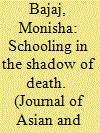| Srl | Item |
| 1 |
ID:
089040


|
|
|
|
|
| Publication |
2009.
|
| Summary/Abstract |
Once viewing African languages as competitors to French, policymakers in France now welcome these languages openly in African schools. This is a dramatic policy reversal, and it contradicts expectations of path dependency and policy inertia. The policymakers' conversion can be traced to the writing and advocacy of a strategic scholarly community, which began exercising influence over the leadership of France and la Francophonie in the 1990s. Their influence changed the perception of French leaders regarding the utility of local languages in education and caused them to include this element consistently in their education strategy for Africa. In contrast, a lack of comparable agreement within the intellectual communities of the Anglophone world has led to ambivalence in support for mother tongue education emanating from dominant English-speaking states. Unlike traditional accounts of epistemic communities, this study highlights the strategic political activity of scholars. The major focus is on the process of idea change among policy makers in France. I suggest that this idea change altered the field of permissible options for African leaders, revealing a continued ideational dependency between metropole and periphery.
|
|
|
|
|
|
|
|
|
|
|
|
|
|
|
|
| 2 |
ID:
082687


|
|
|
|
|
| Publication |
2008.
|
| Summary/Abstract |
This article explores how Zambian youth encounter HIV/AIDS in their schools and communities, and presents ways in which they demonstrate their agency in creating new language, identities, and self-conceptions in response to these encounters. Utilizing qualitative interviews, participant observation, and student diaries, this study suggests that the role and delivery of schooling must be re-examined given high teacher mortality, teacher misinformation, and young people's exposure to the disease outside of schools. Students' diverse experiences in and outside of school shape their knowledge and beliefs about HIV/AIDS in a time when all social institutions in Zambia have been affected by the disease
|
|
|
|
|
|
|
|
|
|
|
|
|
|
|
|